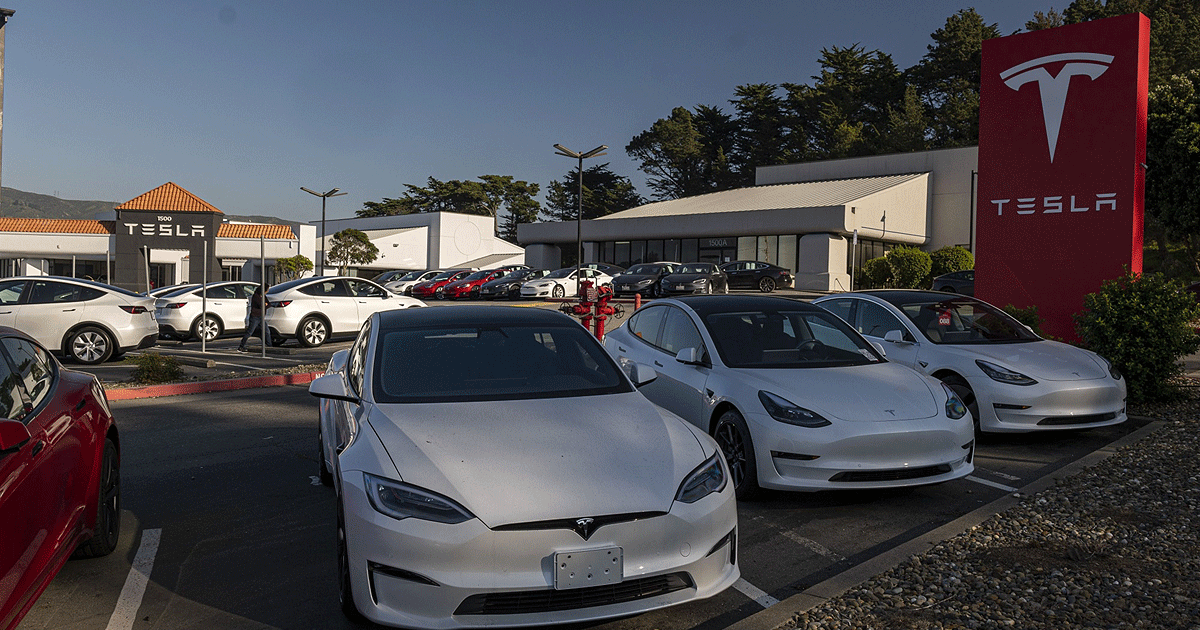
An American automaker wears the U.S. luxury sales crown for the first time in nearly a quarter century.
After being bested by just 23,244 vehicles in 2021, Tesla grabbed the luxury sales throne from BMW — thumping the German automaker with a 158,612-vehicle lead last year, according to Automotive News Research & Data Center estimates. Austin-based Tesla does not break out sales by region or country. Mercedes-Benz placed third, followed by Lexus, Audi and Cadillac. Tesla delivered an estimated 491,000 vehicles in the U.S. last year, up 44 percent, and crossed 1 million deliveries globally.
It’s been a swift rise for Tesla from nearly-bankrupt startup to sales juggernaut in a little over a decade.
The paradigm has shifted with electric vehicle sales dominating the luxury segment, said Tyson Jominy, vice president of data and analytics at J.D. Power.
“Not only do luxury buyers want EVs, but the one that only sells EV is now the sales leader,” Jominy told Automotive News.
Tesla’s sales sweep sends a message to the industry: “If you want to be at the top of the luxury segment, you’ve got to beat Tesla, and you’ve got to do it with EVs,” Jominy said.
Tesla brought BMW’s three-year reign over the luxury market to an end as it ratcheted up production and discounted some models.
Overall, U.S. luxury sales dipped in 2022, while the broader market declined about 8 percent.
Porsche Cars North America is expected to report fourth-quarter U.S. sales on Thursday.
U.S. vehicle registration data, a lagging proxy for vehicle sales, showed Tesla with a 124,786-vehicle lead over its nearest luxury competitor through October.
Last year, BMW delivered 332,388 sedans and crossovers in the U.S., down 1.3 percent. Crossovers and an expanding fleet of all-electric models powered sales at the German automaker. U.S.-built light trucks accounted for more than 60 percent of BMW sales last year, while the brand’s three BEV models made up about 4.7 percent of U.S. sales.
“We see very strong demand for EVs,” BMW of North America sales boss Shaun Bugbee told Automotive News in October. “Our gate is really our limitation on volume right now in terms of supply.”
Despite lingering production challenges, the automaker said its Spartanburg, S.C., assembly plant — BMW’s largest in the world — achieved its second-highest annual output last year.
With high-performance vehicles and CEO Elon Musk’s cult of personality, Tesla has parlayed first-mover advantage in the EV space into a formidable market share.
Through October, Tesla commanded nearly two-thirds of the EV segment in the U.S., more than the rest of the industry combined, according to registration data tracked by Experian.
Keeping that lead will be more challenging as industry giants from Ford to Volkswagen electrify their fleets and build networks of billion-dollar battery and assembly plants.
In the first 10 months of 2022, legacy automakers and non-Tesla startups saw an 81 percent surge in EV registrations. Tesla registrations, meanwhile, rose 50 percent, Experian reported.
Mercedes-Benz made a late rally to overtake Lexus for a podium finish in 2023.
The German automaker delivered 286,764 luxury vehicles in 2022, an increase of 3.9 percent. It was one of just four major luxury brands, along with Tesla, Cadillac and Genesis, to post sales gains last year.
Mercedes’ fourth-quarter deliveries surged 21 percent, fueled by the launch of three EQ all-electric models at the end of 2022.
The brand also focused on driving sales of high-end models, such as the S-Class and AMG, which accounted for 29 percent of deliveries.
“That was very positive on the profitability levels, for us and for our dealers,” Mercedes-Benz USA CEO Dimitris Psillakis told Automotive News.
Tight new-vehicle supplies squeezed Lexus last year. The Japanese brand delivered 258,704 vehicles last year, a 15 percent slide from 2021, enough for No. 4.
At times midyear, Lexus’ vehicle supply on dealer lots was measured in hours, not days, according to monthly inventory reports.
“On average, there is probably about a three-month wait” for new Lexus vehicles, depending on model, brand boss Dejuan Ross said, noting wait times can range from two months to “over 18 months” for the LX.
Swedish automaker Volvo’s U.S. sales slid 16 percent last year to 102,038. Volvo cited supply chain challenges and production slowdowns caused by component shortages and COVID-related lockdowns in China.
Volvo’s EV sales surged last year as the automaker seeks to go all-electric by 2023. In 2022, the brand’s Recharge models — vehicles with fully electric or plug-in hybrid powertrains — accounted for 27.4 percent of sales, with BEVs at 7.2 percent, up 22.3 and 14.3 percent, respectively.
Larry P. Vellequette contributed to this report.